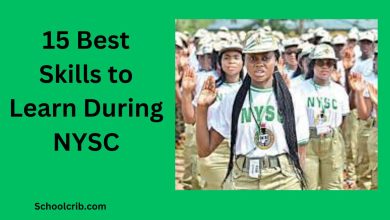15 Secrets of First Class Students in Nigeria

If you are searching for the secrets of first class students in Nigeria, you are in the right place!
Who wouldn’t want to make first class in the university? Am sure everyone wants to.
But does every student actually get first class? The answer is a big no.
In fact, only a few students end up making first class at the university.
This means that there is something these few students know that others don’t know.
If you want to make first class in the university, you have to be intentional about it.
You can’t be a lazy student and expect to get first class. You have to work hard for it.
The truth is that first class students have some secrets. Yes, they do! This may sound funny but it’s actually true.
There is something first class students know that others don’t know, but don’t worry, am here to reveal everything to you.
In this guide, I will be showing you 15 secrets of first class students in Nigeria.
By knowing these secrets and working towards them, you can increase your chances of making first class.
Ready? Let’s go!
Also Read: Top 15 Cheapest Private Universities Offering Nursing in Nigeria
15 Secrets of First Class Students in Nigeria
Here are the 15 secrets of first class students in Nigeria:
1. Effective Time Management

First-class students ace the game with effective time management.
They craft well-structured schedules, slotting study time, reviews, and tasks in a balanced way.
Goals are like guiding stars; they set clear targets and break them into manageable bits, ensuring they’re on track.
Deadlines are sacred, so they hustle intelligently, making every minute count.
Balancing academics and personal life is their forte, ensuring burnout is a thing of the past.
Overall, these students master the clock, optimizing productivity, and achieving top-notch academic performance—it’s a game-changer in their success story.
2. Consistent Study Routine

First-class students abide by a consistent study routine. It’s like having a reliable roadmap.
They schedule their study sessions like appointments and stick to them religiously.
Every day, they carve out dedicated time for studying, revising, and tackling assignments.
This routine is their secret sauce—it keeps them on track, builds familiarity with the subjects, and boosts their understanding.
Imagine it like a well-tuned instrument; the more you practice, the better you play.
That’s the consistency they bring to their studies, ensuring that when exams come knocking, they’re more than ready to ace them.
3. Active Participation in Classes

First-class students are the class stars, not wallflowers.
They dive headfirst into class discussions—asking questions, sharing thoughts, and soaking up knowledge like sponges.
It’s like being in a learning jam session where they’re not afraid to rock the mic.
By actively participating, they grasp concepts better, clarify doubts, and gain diverse perspectives.
Picture it as being in the front row of a gig—engagement amplifies the experience, and for them, learning is the ultimate show.
This enthusiastic involvement showcases their hunger for knowledge and sets the stage for their academic success.
Recommended: 15 Ways to Prepare for University Life in Nigeria
4. Utilizing Available Resources
First-class students are savvy resource hunters.
Think of them as academic detectives, always on the hunt for the best info.
They raid libraries, plunder online articles, and raid academic journals, seeking knowledge gold.
It’s like having a world of wisdom at their fingertips.
By tapping into diverse resources, they enrich their understanding, giving them an edge.
Picture it as assembling a squad for a mission—every resource is a valuable team member.
This strategy is their secret recipe for success, helping them ace exams and outshine the competition.
They know that to be the best, you’ve got to use the best.
5. Seeking Academic Support
First-class students are like teamwork maestros.
They know asking for help isn’t a sign of weakness, it’s a power move.
Whether it’s waving the flag for professors, mentors, or study buddies, they’re not too proud to seek guidance.
Imagine it’s like crafting a recipe—each input enhances the flavor.
By seeking academic support, they untangle complex topics, gain fresh perspectives, and solidify their knowledge.
It’s like having a mentor in a video game—they guide you through the levels.
This collaborative spirit propels their academic journey, ensuring they’re always at the top of their game.
They understand that sometimes, you need a little assist to score big.
6. Effective Note-taking
First-class students are note-taking ninjas.
They don’t just jot down words; they capture lectures like it’s a mission.
It’s about finding their note-taking groove—shortcuts, symbols, doodles—they’ve got their secret language.
These notes aren’t just reminders; they’re their study cheat codes.
Imagine it like having a superhero’s handbook; every note is a superpower.
By crafting effective notes, they simplify complex ideas, making revision a breeze.
It’s like having the cliff notes to success.
This knack for effective note-taking isn’t just a skill—it’s their academic sidekick, always ready to help them conquer exams and rise to the top.
Also See: 15 Things a Student Can Sell in a Hostel in Nigeria
7. Setting Clear Goals
First-class students are goal-setting champs. They’re not wandering stars; they’re on a mission!
Goals for them are like setting coordinates on a treasure map.
Whether it’s conquering that tough course or nailing the semester GPA, they break it down into bite-sized goals.
It’s like leveling up in a game; each goal is a challenge they’re excited to beat.
By setting clear goals, they’ve got their eyes on the prize, and that prize is academic success.
It’s not just about dreaming big; it’s about breaking those dreams into achievable steps and putting in the hard work to make them a reality.
Goals are their secret sauce to reach the academic stars.
8. Regular Self-Assessment
First-class students are their own academic coaches, and self-assessment is their playbook.
It’s like being the MVP of your own game and watching the replay to up your skills.
They don’t just submit assignments; they give them a thorough post-match analysis.
Picture it like being a detective—they search for clues to improve.
By looking at their study routines, and understanding what worked and what didn’t, they fine-tune their strategies.
It’s like having a fitness tracker for their academic performance.
This constant self-assessment isn’t about being critical; it’s about being better and inching closer to that first-class victory.
They know they’re the captains of their ships, steering toward excellence.
9. Prioritizing Health and Well-being
First-class students treat their bodies and minds like temples.
It’s not just about hitting the books; it’s about hitting the gym too.
Picture it like being a superhero—they know their powers are useless without a healthy lifestyle.
They get enough sleep, eat good foods, and get their daily dose of exercise.
It’s like prepping for a big game; a healthy routine ensures they’re match-fit for exams.
By putting health first, they’re always on the top of their game, ready to tackle any academic challenge that comes their way.
After all, you can’t conquer the academic world with a tired mind and body!
Also Read: 10 Tips on How to Pass WAEC with Flying Colors
10. Effective Group Study
First-class students know that two (or more) heads are better than one.
So, they gather with their study buddies, sharing knowledge and cracking the academic code together.
It’s like a brainstorming session where everyone brings their best ideas to the table.
This group synergy enhances their understanding, helps clarify tricky concepts, and motivates them to stay on track.
Picture it like having your own personal Avengers team for academics.
Together, they conquer the toughest subjects, making group study a secret tool in their quest for first-class honors.
They understand that teamwork makes the dream work in the world of academia.
11. Effective Communication Skills
First-class students are not just book-smart; they’re wordsmiths. They don’t just write; they wield words like magic wands.
It’s like being a charismatic speaker at an academic TED talk—they articulate their thoughts with finesse.
From class presentations to essays, they spin a captivating yarn. It’s like having a superpower in their vocabulary toolkit.
These skills make their ideas pop, ensuring their message is loud and clear in the academic arena.
Mastering this art of expression isn’t just about eloquence; it’s about making their knowledge shine and leaving a lasting impression.
After all, in the academic world, being articulate is their superhero cape!
12. Seeking Extra Learning Opportunities
First-class students are knowledge adventurers, always on a quest for more.
It’s not just about the classroom; they’re explorers of seminars, workshops, and online courses.
Imagine it’s like being in the front row of a knowledge rock concert—every experience is a new riff in their academic playlist.
These extra learning opportunities broaden their worldview, giving them a taste of the latest trends and insights.
It’s like having a backstage pass to the academic show.
By seizing these chances, they stay ahead of the game, making sure they’re not just reading the chapters, but writing the next ones.
In the academic world, being an eager learner is their ticket to the front row.
Recommended: 15 Business Ideas for Students in Nigeria
13. Adaptability and Flexibility
First-class students are masters of adaptability and flexibility.
They know that rigidity won’t cut it in the fast-paced world of studies.
It’s not just about having a study plan; it’s about being a study acrobat—ready to flip and twist as needed.
Imagine it’s like doing a high-wire act in a knowledge circus; every step needs precision and balance.
These qualities help them smoothly juggle assignments, diverse study groups, and surprise quizzes.
It’s about being the Jackie Chan of academia—adaptable, flexible, and always landing on their feet.
By embracing change and staying agile, they thrive in the academic circus, showcasing their true prowess.
14. Staying Organized
First-class students are the conductors of their academic symphony, always in perfect harmony.
It’s not just about having a clean study desk; it’s about organizing their entire academic universe.
Imagine it like having a neatly arranged toolbox for success—every tool is easy to find.
They structure their schedules, keep notes in order, and manage their resources efficiently.
This organization isn’t just about appearances; it’s about reducing stress, boosting productivity, and making sure they’re always on the right academic track.
Think of it as having a well-tuned GPS for their academic journey; they’re never lost, always reaching their destination with precision, and that destination is first-class honors.
15. Believing in Self
First-class students are their own biggest fans. It’s like having a personal pep talk before the academic match.
They don’t just study; they believe in the power of their own brain.
Picture it like being the hero of your favorite movie—they’re their own academic superheroes.
This self-belief isn’t just a pat on the back; it’s rocket fuel that propels them through the toughest exams and projects.
It’s like having a secret tool in their arsenal.
By knowing they’ve got what it takes to ace it, they’re ready to tackle anything that comes their way in the academic arena.
After all, in this academic game, being your own champion is the ultimate winning strategy!
Also See: Top 15 Highest-Paying Courses in Nigeria
Frequently Asked Questions (FAQ)
How to Can I Avoid Sleepiness While Studying?
To avoid sleepiness while studying, get enough sleep regularly; a well-rested brain is alert.
Choose a well-lit and airy study space to keep drowsiness at bay.
Take mini breaks – stand up, stretch, maybe do a quick dance to stay awake.
Stay hydrated and munch on light, energizing snacks. Make your study active – ask questions, and take notes.
Experiment with your study schedule to find your golden hours of focus.
If the yawns hit, splash your face with water or switch to a different topic.
And don’t forget to treat yourself after a productive session; it’s a great motivation booster!
How Many Hours a Day Is Best to Study?
There’s no one-size-fits-all answer. It’s more about quality over quantity.
Aim for about 1 to 2 hours per subject daily, but make those hours count.
Stay focused, take short breaks, and mix up your subjects to keep it fresh.
Your brain needs time to absorb, so don’t cram everything in at once.
Feel your rhythm—some people rock short, intense sessions, while others like a longer grind.
Experiment and find your study sweet spot. Consistency beats a marathon study session any day.
So, keep it real, and study smart, not long!
How Can I Study and Remember Everything Fast?
Studying smart is the key. Set up a quiet study spot without distractions.
Break your study time into chunks—it’s easier on the brain.
Actively engage with the material: explain it in your own words or make a cool diagram.
Flashcards and doodles are your pals—they help memory.
Revise stuff regularly; spaced repetition is your memory’s best friend.
Don’t just memorize, understand the why behind it. Relate new stuff to what’s already up there in your brain.
And don’t forget your beauty sleep and healthy habits—they boost brainpower.
Study savvy, not hard, and you’ll ace that info in no time!
How Can I Be Brilliant in All Subjects?
Being brilliant in all subjects isn’t about being a genius, it’s about a strategy.
Firstly, understand the basics well; they’re like your foundation.
Practice regularly and actually get what you’re learning, not just rote memorization.
Plan your study time and set achievable goals for each subject.
Be an active participant in class—ask questions, and join discussions.
If you’re struggling, grab extra resources like books or online tutorials.
Adjust your approach to suit each subject; one size doesn’t fit all.
Stay positive, even when it gets tough.
Remember, brilliance comes from consistent effort, believing in yourself, and a dash of resilience.
What Makes a First Class Student?
Being a first-class student isn’t just about grades—it’s a mindset and approach to learning.
They ace academics with a solid work ethic, organized study routines, and time management skills.
Actively participating in class, asking questions, and seeking to understand the material set them apart.
Yet, they’re not just book-smart; they balance with extracurriculars, developing leadership and teamwork.
Critical thinking and adaptability are their buddies.
It’s about being curious, engaged, and striving for excellence, both inside and outside the classroom.
Overall, being a first-class student isn’t just about getting an ‘A,’ but about embracing a holistic, enthusiastic approach to education.
Also Read: How Many Clothes Should I Bring to University in Nigeria?
Conclusion
To make first class, you need to have a well-defined approach to your studies.
The benefits of getting first class in Nigeria cannot be overemphasized and am sure you wouldn’t want to miss out.
In this article, I’ve shown you the 15 secrets of first class students in Nigeria.
Now that you’ve known these secrets, it is now left for you to work towards them and luckily for you, you will end up making first class too.
If you have any inquiries or questions, kindly indicate in the comments section and I will attend to them right away.
Good luck!
Related Posts:
- What Is the Best Age to Enter University in Nigeria?
- Top 10 Problems University Students Face in Nigeria
- Top 10 Best Places to Invest Your Money As a Student in Nigeria
- 15 Tips on How to Survive in a Nigerian University
- 15 Best Side Hustles for Nigerian Students
- How to Save Money As a Student in Nigeria (15 Best Tips)
- 15 Best Apps to Make Money Online in Nigeria as a Student
- How to Pack for University in Nigeria (14 Best Tips)
- Food Timetable for Nigerian Students on a Tight Budget
- How to Make a Food Timetable As a Student in Nigeria








